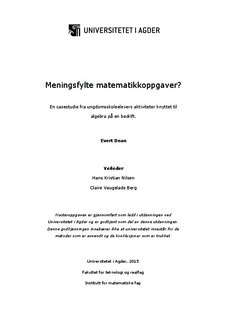| dc.description.abstract | "Meaningful mathematics tasks?" is a case study related to 9th grade in Norwegian lower
secondary school that visited Returkraft, an energy recovery facility in Kristiansand. During a
full day on this enterprise, they worked with tasks that were designed in connection with this
study. ”Algebra på Returkraftskolen” is based on competence goals for functions and
includes two student booklets, one for study preparation at school and the other for enterprise
visit. The students were guided around Returkraft, then worked in group with tasks from
business context and finally summary in plenary. Based on this teaching program, I have
asked two research questions:
• How do the group of students work with algebra when activities take place in an
energy facility?
• What are the students' experiences of these activities when they take place in this
business?
As a theoretical framework for analysis of empirical data, I have based it on some of the basic
ideas in the socio-cultural learning principle, semiotics and Steinbrings epistemological
triangle, mathematical representations, inquiry and realistic mathematics education. I also
mentioned literature reviewing algebraic thinking, mathematics outside the school context,
why algebra is so difficult and alternative view on the relationship between arithmetic and
algebra.
The class was filmed during plenary sessions, and a group of five students were filmed during
work sessions and interviewed afterwards. Transcript of this recording, my notes and student
works in the booklets, formed the empirical data for this study. The findings are analysed and
discussed in relation to the theoretical framework and the authors who are mentioned in the
literature section.
The findings show that this was a safe learning atmosphere where students were supportive
scaffolding for one another, and an incipient understanding of the functions concept took
place in the proximal zone of development. Findings, which confirm that the use of language
is central in mediating the knowledge, are also found here. Students expressed that they had
not managed this alone, but because they cooperated and discussed in groups, they just
managed to solve these tasks. I perceived that the students were motivated and worked hard,
and they expressed that they liked this way of working and would like to have more teaching
in this way. Students were triggered on their creative reasoning through tasks that give
opportunities and challenges to both high and low-performing pupils. This study supports the
theory that inquiry-influenced tasks create a learning conjecturing atmosphere among the
students and gives learning outcome. They commented that it was easier to learn this way,
and they got some professional eye-opening experiences during the day. It was meaningful
mathematics tasks when they could link algebra to a context of real life. The study also shows
how students achieved greater understanding when they managed to combine context with the
mathematical symbols and function concept.
As educational implication, I emphasize the importance of distinguishing between tasks to
stimulate curiosity and reflection, and tasks to automate skills. It appears that exploratory
training programs should be organized in a tripartite: introduction, work session in groups and
summary in plenary. When students work with algebra, it is important that students get
opportunities to link it to different representations: context, natural language, illustrations,
tables, graphs and symbols. Specialization versus generalization in learning processes should
be discussed through all the years training in mathematics. In my view, an altered view on
learning arithmetic in primary school provides better growing conditions for the abstract
instruction in mathematics when students get older. | nb_NO |
